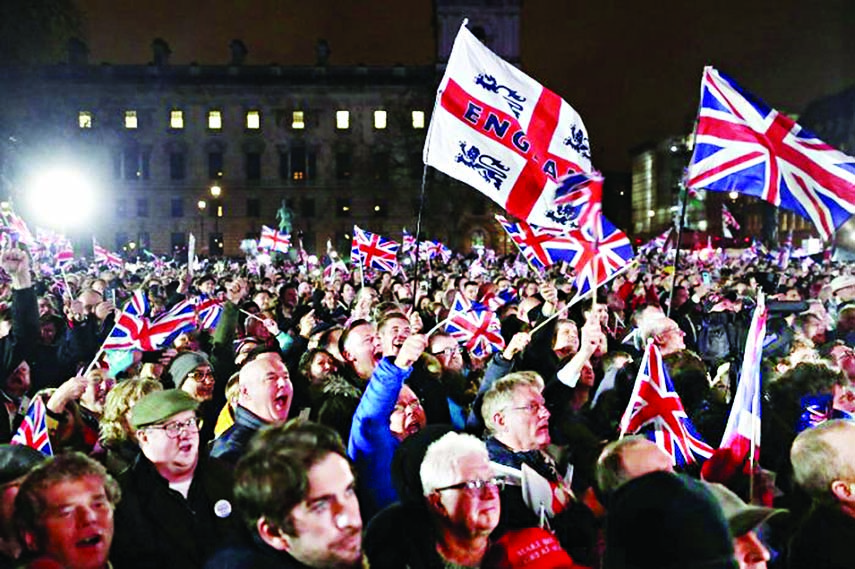
AFP :
Britain on Saturday began an uncertain future outside the European Union, hours after the historic end to almost half a century of EU membership was greeted with a mixture of joy and sadness.
There were celebrations and tears across the country as the EU’s often reluctant member became the first to leave an organisation set up to forge unity among nations after the horrors of World War II. Almost nothing will change straight away, because of an 11-month transition period negotiated as part of the exit deal.
Britons will be able to work in and trade freely with EU nations until December 31, and vice versa, although the UK will no longer be represented in the bloc’s institutions. But legally, Britain is out. Thousands of people waving Union Jack flags packed London’s Parliament Square and sang the national anthem to mark that reality at the moment of Brexit at 11 pm (2300 GMT) Friday-midnight in Brussels. As Prime Minister Boris Johnson-a figurehead in the seismic 2016 referendum vote for Brexit-held a private party in his Downing Street office, a clock projected on the walls outside counted down the minutes to departure. In an address to the nation, he hailed a “new era of friendly cooperation” with the EU while Britain takes a greater role on the world stage. Johnson acknowledged there might be “bumps in the road ahead”, but predicted the country could make it a “stunning success”. “The most important thing to say tonight is that this is not an end but a beginning,” he said in a televised address. However, Brexit has exposed deep divisions in British society, and many fear the consequences of ending 47 years of ties with their nearest neighbours. Some pro-Europeans, including many of the 3.6 million EU citizens who have made their lives in Britain, marked the occasion with solemn candlelit vigils. There was a sombre atmosphere among the passengers on one of the last ferries to leave the European mainland and make the 42-kilometre (26-mile) journey across the English Channel pre-Brexit. “It’s very depressing what’s happening today,” said Alessio Bortone, an Italian who has lived in Britain for 10 years.
Brexit has also provoked soul-searching in the EU about its own future after losing 66 million people, a global diplomatic big-hitter and the clout of the City of London financial centre. French President Emmanuel Macron described it as a “historic warning sign” that should force the EU and its remaining nations of more than 440 million people to stop and reflect. EU institutions earlier began removing Britain’s red, white and blue flags in Brussels ahead of a divorce that German Chancellor Angela Merkel called a “sea-change” for the bloc.
While the divorce terms have been agreed, Britain must still strike a deal on future relations with the EU, its largest trading partner. Both will set out their negotiating positions Monday. Getting this far has been a traumatic process. Britain resisted many EU projects over the years, refusing to join the single currency or the Schengen open travel area, and eurosceptics have long complained about Brussels’ bureaucracy. Worries about mass migration added further fuel to the Brexit campaign while for some, the 2016 vote was a chance to punish the government for years of cuts to public spending.
But the result was still a huge shock. It unleashed political chaos, sparking years of toxic arguments that paralysed parliament and forced the resignations of prime ministers David Cameron and Theresa May. Johnson brought an end to the turmoil in a decisive election victory in December which gave him the parliamentary majority he needed to ratify his Brexit deal. But Britons remain as divided as they were nearly four years ago, when 52 percent voted to leave and 48 percent voted to remain in the EU. “Rise and shine… It’s a glorious new Britain” said the Brexit-supporting Daily Express. The i newspaper, in contrast, headlined: “What next?”
In Scotland, where a majority voted to stay in 2016, Brexit has revived calls for independence. First Minister Nicola Sturgeon tweeted: “Scotland will return to the heart of Europe as an independent country — #LeaveALightOnForScotland.” In Northern Ireland-soon to be the new EU frontier-there are fears Brexit could destabilise a hard-won peace after decades of conflict over British rule. Irish foreign minister Simon Coveney tweeted: “Goodbye & good luck.” Johnson, a polarising figure accused of glossing over the complexity of leaving the EU, made no public appearance on Friday and avoided any official celebrations that might exacerbate divisions. He hosted a special cabinet meeting in the northeastern city of Sunderland, which was the first to declare for Brexit in 2016, while Downing Street was lit up in the colours of the Union Jack flag.
Millions of commemorative 50 pence coins have also been issued. It was a different story in nearby Parliament Square and elsewhere across the country. At a “Big Brexit Bash” in Morley, northern England, Raymond Stott described the four years since the referendum as “a right cock-up”. “I am just glad it’s all over. We will look after ourselves. We don’t need Europe,” said the 66-year-old. Some British expatriates in southern Spain celebrated in bars but for many pro-Europeans, Friday marks a day they hoped would never come. “Today is a day of mourning,” said Katrina Graham, 31, an Irish women’s rights activist who lives in Brussels, at a protest in central London. From Saturday, Britain will be free to strike trade deals around the world, including with the United States. Johnson has given himself just 11 months to negotiate a new partnership with the EU, covering everything from trade to security cooperation-despite warnings this is not enough time. He also discussed with his ministers on Friday an aim to get 80 percent of Britain’s commerce covered by free trade agreements within three years, a spokesman said. US President Donald Trump is an enthusiastic supporter of Brexit, and one of his top envoys on Friday hailed an “exciting new era”.

